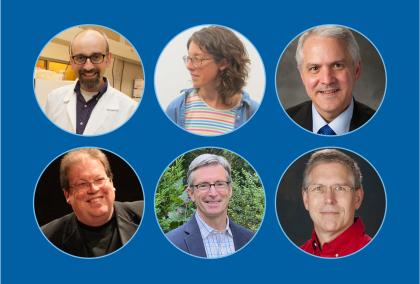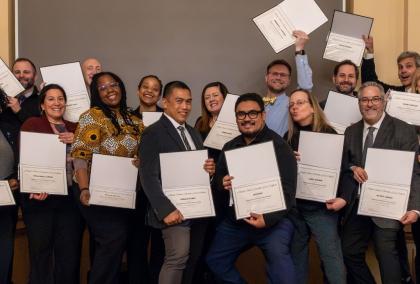Peculiar Corona-Spring in New York City
By Natalia Särmäkari
Published on June 17, 2020
I came to New York City with my spouse and two children aged 4 and 7 in December 2019. It was a beautiful, sunny winter and I was full of enthusiasm, ready to start my long awaited and prepared six-months Fulbright program period at The New School, Parsons School of Design. Our start was slightly turbulent as our first apartment turned out to be rather impossible to live in. One of the walls was completely wet, filling buckets of water during the rain. While we were also aware of the famous clanging pipes and radiators of the city, the one in our bedroom was unbearably loud, waking us up in sweat in the night. On top of this, our upstairs neighbor was working only in the night and doing something very loud. We had to make a big decision and find a new place. It felt stressful and terrifying. However, somewhere around the New Year, we were very lucky to find a lovely home, owned by very nice people, and located in a cozy Brooklyn neighborhood. Furthermore, we managed to get rid of the first apartment without extra expenses (but not without little drama).
Our original plan was to keep children homeschooled by my husband. Our new landlord strongly recommended to enroll them in the local public school, and even suggested to modify our lease so that we could make our own utility bill agreement. We decided to give it a try. We called the parent coordinator of the school and went for a tour. We fell in love with the school immediately. Suddenly, we found ourselves filling in documents for school and going to the Fort Greene Health Center to get the missing vaccines for our children (the immunization program in New York is more extensive than in Finland). Our children started their school soon after and we quickly became part of our local school community. After a couple of weeks, we were already spending Saturday night at a house of one of the families and another Sunday we were ice skating with school friends in Prospect Park. Now it all feels like precious, warm, and distant memories.
The news about the coronavirus started crippling around the beginning of the year. Actually, I remember quite vividly the first time I read about it in a Facebook post by a fellow Fulbrighter. Yet, it seemed like a random weird virus, concerning a small number of people somewhere far away. It was just news among other news, just another flu. The news, however, didn’t stop there and it seemed that China was, little by little, getting hit by the virus. It still felt distant and not related to us in any way. Yet, we decided to watch the Pandemic series on Netflix. The series started by pointing out that it’s only a matter of time when there will be a global pandemic. I was still in denial (as were all the countries outside Asia), saying that, hey, isn’t the ordinary pneumonia also quite dangerous to older people? I learned a few months earlier, while our whole family had a horrible pneumonia (what a coincidence!), that around 1-2% die from it. Somehow, I never thought before that a flu could be fatal. Coronavirus seemed to have a higher percentage of deaths. We finished the series and hoped that China would beat the virus soon.
By the end of January, the first coronavirus case was confirmed in the U.S. In February, the news started to report more and more cases in Europe, in the US and eventually in New York. They were all more or less connected to Wuhan. Life was still normal in New York, even though WHO had announced a global health emergency. At the beginning of March, we celebrated our son’s birthday with many friends from his class and some of their parents. Soon after, I travelled to Kansas City for a Fulbright Enrichment Seminar. We were recommended not to shake hands and to wash our hands thoroughly. We visited a lot of different (crowded) places and had a hospitality dinner at a home of an adorable local family. The situation in Italy was already very bad and I asked an Italian Fulbright scholar in the field of healthcare, what was happening there.
I will never forget the day after I came back to New York on March 8th. I went to our local store for groceries and suddenly realized that people were alarmed and hoarding things. This was the moment when my mode switched from normal to apocalyptic. I bought a lot of things too, just in case, and walked home with my heart beating out of my chest. What was going on? For the first time in my life I felt like I was in survival mode, priorities straightened out in my mind. I made a plan for the next week, when I will go to the pharmacy, print out all the health documents at the campus and return all the children’s books to library, just in case.
That week, I had also scheduled two interviews for my research, was auditing a class and had to give an important lecture that I had prepared thoroughly for a while. When commuting from Brooklyn to Manhattan, the subway was still packed, but some people were wearing masks or, at least, gloves and scarves around their faces. On Tuesday, while auditing the class, I realized again how serious the situation was. Half of the class was not attending, and the professor seemed alarmed, talking about the uncertain future and that probably we are not returning to the campus any time soon. After the class, the professor collected all possessions from the office and we took the subway together, because our neighborhoods are close to each other. I said quick thanks and goodbye at my stop as we both had a feeling that we’ll not be seeing each other again. Some universities already announced that they were closing their campuses.
The next morning, I went to the pharmacy and bought a lot of medicine. There were loads of people doing the same and the shelves were half empty. I even bought a vaporing machine for breathing, just in case. I still had a vivid memory of my earlier pneumonia (and my lungs haven’t fully recovered to this day) and figured that this kind of machine would have been nice back then. In the evening I gave the lecture, and to my surprise, most of the class attended. Ironically, my topic was timelier than ever – it was about virtual fashion. Later in the evening the US banned all travel from Europe. That week, I even managed to do both scheduled interviews and print everything I needed. On Thursday, March 12th, I said goodbye to Parsons and to Manhattan - it was the last day in the city and subway. Our children went to school the next day, and even though the closure of schools was not announced yet, they were given all their things and drawings – many parents, ourselves included, already decided that the children would stay home. During the weekend, officials said that the schools would be closed.
Our home country Finland started their lockdown a few days later. They also announced the closure of the Finnish borders on March 19th. This all was so emotional and shocking – I can’t even describe the feelings because I’ve never had such feelings before. It was a mix of panic and determination. Our new prime minister, with her fellow ministers, was so serious and vigorous. No one could imagine that they would be giving this kind of briefing and placing our country into a state of emergency that we haven’t had since the Second World War. Everything felt so weird and terrifying. Suddenly, we realized that the majority of the countries were now in a state of emergency. We were getting messages from our friends and families all the time, as well as emails from my home university and others. Everyone was asking what we were planning to do now – and we didn’t know - staying here, I guess. On March 18th the Finnish Embassy wrote us that travelling to Finland will be restricted on the 19th at midnight (in eight and a half hours) and we should leave immediately if we were planning to leave. The last Finnair flight was at around eight PM. First, we panicked and thought that we should pack and go, but then we calmed down and decided to stay. The Finnish Embassy sent us a survey regarding our plans to return and later they called us a couple of times to check on us. They emphasized that they encouraged everyone to leave and that they would help with arrangements, if necessary. Also, my home university offered help with arrangements to return.
Despite all this, we stayed. Why? At the end of the day, the decision was quite intuitive. We just felt like staying. Of course, there were many real reasons too, for example, we had a tenant in our apartment in Helsinki until June. Our home in Brooklyn, in turn, was bigger and had an exceptionally large, green backyard. It just felt nicer to be quarantined here. Oddly, we settled in our home, neighborhood and the community so well that it felt like our happy place here. We didn’t want to leave this place because returning Finland felt distressing. Our appreciation for the children’s school continued to grow because the remote learning was organized so fast and well and there were still all the same lovely faces. I’m already really, really sad that we will have to say goodbye to the school and to this neighborhood, eventually. We feel like part of the community here and I don’t understand how this happened so fast.
Later in March the soundscape of our neighborhood consisted mainly of two sounds: the ambulances and emergency sirens and the birds in our backyard. The sirens were singing around the clock while the birds were singing mostly early in the morning. The first couple of weeks in lockdown I spent rather paralyzed, checking the news all the time and watching the governor’s briefings on a daily basis. At some point, the numbers of corona cases and casualties became so shocking that I couldn’t grasp the situation anymore. I stopped watching and reading intensively the news and decided to concentrate on everything else: on teaching the children, working as much as I can, and doing household chores. We took a huge risk in staying – and we are still taking that risk.
The last two and a half months haven’t been easy. Especially, the last few weeks have been extremely mentally demanding for the whole family because we have spent so long time together at home, without seeing anyone else in real life. Piles of unfinished and delayed work have grown, and no matter how well we try to plan out our days, we are not able to get enough done – my husband having surprise obligations remotely with Finland and me with my Finnish university. Fortunately, I didn’t need to change my research work much and I was able to continue with it remotely.
But it is hard to explain to people who are not in the same situation how hard it is to combine remote schooling of and staying home with two different aged children, as well as taking care of the home and work. Children need a lot of help with school, we have been fighting a lot because they have become very restless and ill behaving. Our children go to sleep too late because they don’t spend enough physical energy during the day – and I don’t have even the evening hours to concentrate on my work. I have extended my working hours to the nights or very early mornings. Even though we could go outside and to the parks (which we are lucky to have several in a walking distance!), we don’t have time to do that. The moment we get our computers back from homeschooling we need to start working as the children play videogames or whatever that keeps them occupied for more than a minute. I haven’t had a day off for a long, long time. I’m not even able to relax anymore because I’m thinking about all the work I’m trying to catch up with.
On top of this, I’m worried about our trip back home. It’s approaching to take place at the end of June and at the moment our airline company doesn’t fly from New York at all. I hope this will change in a few weeks from now. I have already spent hours on the phone, trying to reach our travel agency and airline company about the tickets that disappeared from the system. Finally, the issue was sorted out, but it required a lot of discussion over the phone. Now, no one can promise whether we will be able to use our tickets or will we have to book some other route. If our airline will not be flying or will not be able to arrange alternative flights from another American city, we will have to contact our embassy and ask for their help – maybe even a financial one. At the moment, though, it feels that everyone has forgotten the alarming corona situation and are just waiting for the re-openings. If needed, will we get as much help as we were offered in March? Or is everyone as tired as we are, not having any energy left to solve the problems of returning Finns? Will we be able to return home by the end of our U.S. visas, expiring at the end of June?
Finland seems to be in an entirely different situation as New York. Children are back at schools and playgrounds, people are not wearing masks and everyone is sharing on social media how many restaurant reservations they made for June. People are returning to private social gatherings and spending time at their summer cottages. Unfortunately, we don’t have a summer cottage to quarantine ourselves when we will return back to Finland. We will stay in our compact city apartment, which, on the other hand, our children miss quite a lot. I have very mixed feelings about returning back to Finland: I know that our life will become much easier there, and at the same time, I already miss New York and everything we wanted to do here. While we spent most of the time isolated and indoors, the city feels closer and dearer than ever because of this tragic pandemic spring. I will also miss my host university, host professor and our children’s school a lot. I feel lucky to have been part of these communities and were able to get to know the people, who somehow became very important despite only virtual contact. Experiencing the scary times together left a special trace. I’m very sad to leave these communities and the city, and at the same time grateful for having experienced their warm, welcoming and positive attitude.


